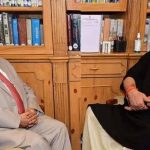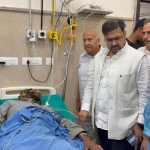SRINAGAR, MAR22:In preparation for the upcoming LokSabha Elections 2024, the Election Commission of India (ECI) conducted the first randomisation of Electronic Voting Machines (EVMs) for all eight Assembly Constituencies of Srinagar District. The event took place at the Meeting Hall of the DC Office Complex on Friday under the supervision of District Election Officer (DEO), Srinagar, Dr. Bilal Mohi-Ud-Din Bhat. Various representatives from Registered Recognized Political Parties, Assistant Returning Officers (AROs), Deputy DEO, and other Officers of the District Election Authority were present during the process.
The randomisation process involved the allocation of Ballot Units, Control Units, and VVPATs for the eight Assembly Constituencies, with each constituency receiving the required number of EVMs along with an additional 40% as reserves for use during the polls. Srinagar District has a total of 929 Polling Stations, and the allocation of EVMs per Assembly segment is as follows: 163 for 19-Hazratbal, 176 for 20-Khanyar, 179 for 21-Habbakadal, 191 for 22-LalChowk, 127 for 23-Chanapora, 200 for 24-Zadibal, 104 for 25-Eidgah, and 158 for 26-Central Shalteng.
The entire process was meticulously recorded on video in accordance with the guidelines set by the Election Commission of India. Before the randomisation process commenced, the DEO Srinagar briefed the representatives of the Political parties, ensuring their confidence in the integrity of the process. He emphasized that all necessary measures have been implemented to uphold the sanctity of the polls in a free, fair, and transparent manner as per the guidelines of the Election Commission of India.
DEO Srinagar highlighted that the randomisation of EVMs, facilitated by dedicated software, aims to ensure transparent and fair elections without any human interference. He further elaborated that following the randomisation, the EVMs will be securely transferred to designated Strong Rooms of the respective constituencies under rigorous security and surveillance.
Representatives from various political parties, including CPIM, BharatiyaJanata Party, Indian National Congress, Peoples Democratic Party, and J&K National Conference, attended the first phase of the randomisation process, underscoring the importance of their participation in the electoral process.









